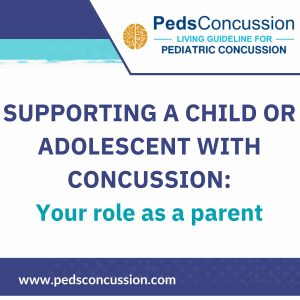Post-concussion Patient Information Sheet for Healthcare Professionals Handout by CHEO-RI
Post-concussion Patient Information Sheet for Healthcare Professionals Handout:
If you think the athlete has a concussion:
- Remove them from the activity
- If the person has any ‘red flag symptoms’ this may indicate a more serious head or neck injury and an emergency medical assessment is required. Call an ambulance immediately.
- RED FLAG SYMPTOMS: severe or worsening headache, neck pain or tenderness, double vision, seizures or convulsions, loss of consciousness, increase in confusion, restlessness, agitation, or aggressive behaviours, repeated vomiting, or slurred speech. These red flag symptoms may appear immediately or within a few hours or days after injury.
- Contact the parents or caregivers immediately if it is not your child and do not leave the person alone.
- For a suspected concussion, bring the person to see a medical doctor or nurse practitioner as soon as possible .
Other Handouts Available for Download:
Concussion Handout for Coaches
Concussion Handout for Parents

